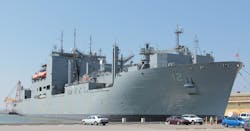The ongoing COVID-19 pandemic and Russia’s invasion of Ukraine are just two recent events that have stressed our nation’s “just-in-time” and “ruthlessly cost-efficient” national defense supply chain. While the defense industry is subject to the same delays and budget overruns caused by supply chain disruptions that influence the private sector, the consequences can be more dire—such as an inability to meet strategic defense objectives and combat casualties.
Strengthening our nation’s defense supply chain will require fundamental changes in the way that the government and private sector conduct business.
Increase Domestic Sourcing
The United States has become too dependent on foreign-made parts, materials, and minerals—especially from China. The military and its partners rely heavily on rare-earth elements and critical minerals from China to produce permanent magnets, advanced lithium batteries and other components critical to military and essential civilian technologies. The Department of Defense (DOD) noted that China dominates the global advanced battery supply chain by providing 94% of the lithium hydroxide and 70% of the lithium carbonate.
If China makes good on its threats to invade Taiwan, we may be entirely cut off from these critical supplies.
The U.S. government should explore adjusting regulations surrounding domestic mining capability, re-examining recent cancellations of long-held mineral leases and strengthening partnerships with allied nations that can also supply these critical minerals. Policymakers should consider tax and other incentives to support domestic onshoring of minerals production as a complement to Defense Production Act grantmaking.
Make Unencumbered Delivery a Priority
Port congestion that affects the commercial maritime cargo industry equally impacts the "just-in-time” delivery of military parts. Our defense industry’s ability to support national security remains as compromised as our ability to move basic household commodities.
In 2015, long before the pandemic, a Federal Maritime Commission report signaled issues with the supply chain. In the years since the report was published, 90% of the issues outlined have taken place. Last fall, the administration and port authorities took short-term action to mitigate disruptions prior to the holiday season, but long-term solutions to these perennial challenges are critically necessary.
We need unencumbered delivery routes that get parts and materials to the “points of need” on time and to do this we need to lessen our dependence on foreign cargo carriers and improve the efficiency of our ports.
Remove Barriers to the Defense Marketplace for Small and Medium-Sized Businesses
Kurt Wendelken, vice commander of the Naval Supply Systems, stated at the Sea-Air-Space conference in April that 80% of his command’s suppliers are single-source. There is no other company that produces these items. While many smaller suppliers may provide “niche” parts or services, these suppliers in fact are often critical for keeping military aircraft, vessels, weapons and other equipment operational.
Impacts on supply chains disproportionately impact these small and medium-sized businesses that make up most of the prime and sub-tier defense suppliers of essential parts—parts such as motors, controls, valves, hoses and electronics to the military, shipbuilders and other large defense contractors.
According to Wendelken, new vendor companies fell 20% from 2018-2020, and another 20% of our defense sector suppliers left the industry over the past five years. The DOD has recognized the uphill challenge in participating in defense procurements. Government business practices are known to create barriers and minimize incentives for the most innovative companies that may be able to support DOD with goods and services critical to national security.
With the United States’ most innovative small businesses under increasing threat from attempts by foreign actors to influence and disrupt them, the next step is for the DOD to address barriers to entering the defense marketplace and improving access to capital for small businesses.
Increase Skilled Labor Recruitment and Training
The nation faces a skilled labor shortage, and the cost is decreased productivity and lost innovation. These workers are the backbone of the maritime and defense industrial base. According to the Aerospace Industries Association, the industry lost 87,000 jobs, or about 4% of its workforce, in 2020. Approximately 64% of those jobs were lost due to supply chain issues, such as a lack of raw materials, backlogged ports and a dearth of shipping containers and truckers that disproportionately impacted small and medium-sized businesses.
Improvements to productivity achieved from automation and other technological advances alone will not offset the void of a talented workforce. It’s essential that we build a pipeline of skilled workers, establish training and mentoring programs, create institutions and adopt policies that will encourage young people to develop these skillsets and pursue these career opportunities.
The U.S. government can play a major role in restoring a deep bench of talented workers through expanding efforts and investments in defense industrial base recruitment and training.
Today’s supply chain challenges will become tomorrow’s crises if we do not thoughtfully address the underlying causes. For supply chains to be resilient, they must be diverse, robust and secure. Consideration must be given to where we source our materials and which companies produce even the smallest components—as well as the workers who design, engineer and assemble those components. We can’t allow ourselves to be overly reliant on other nations for our defense, especially China.
America’s defense industrial base and its supply chain requires a fundamentally different approach to the way we do business. Absent action, our national security will fall victim to the same supply chain disruptions that plague the global economy.
George Whittier is CEO of Fairbanks Morse Defense. Ben Bordelon is President and CEO of Bollinger Shipyards.
About the Author

George Whittier
CEO, Fairbanks Morse Defense
George Whittier is the chief executive officer of Fairbanks Morse Defense. George is a growth-oriented leader focused on creating and implementing the vision, strategy, and values for the company to best serve its customers.
George re-joined the company in January 2020. He served as President of the Fairbanks Morse division from 2009-2012. He previously held leadership positions at Precision Castparts Corporation, Regal Rexnord Corporation, and the Morey Corporation. George serves on the Board of Beloit 200 and is also a Board Member of PDC, a manufacturer of hydrogen processing equipment.
George graduated from the University of Cincinnati with a BS in Mechanical Engineering Degree and an MBA from Queens University of Charlotte. Upon graduation, he joined Coltec Industries prior to it becoming EnPro Industries. He worked there 17 years, culminating as President Fairbanks Morse before leaving the company in 2012. George holds a Six Sigma Black Belt and is well versed in the 80-20 business philosophy.
